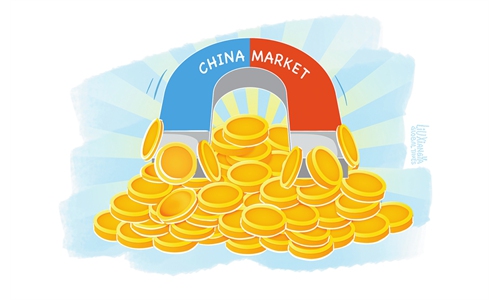
Illustration: Liu Xiangya/Global Times
Following the US Federal Reserve's interest rate cut in mid-September and China's introduction of stimulus policies that exceeded market expectations, the prices of yuan-denominated assets have rallied amid volatility, garnering significant attention from foreign investors.Fueled by speculative sentiment, foreign media outlets' narratives have become polarized. When Chinese stocks surged for several days in late September, some foreign commentators suggested that this could lead to an influx of international hot money.
Conversely, other analysts pointed to last week's fluctuation in the Chinese stock market, raising concerns that the recent rapid rise might merely be a "flash in the pan."
The speculative behavior of international hot money has a double-edged sword effect on the financial markets of any economy. It can bring short-term liquidity and investment opportunities, but it can also trigger financial risks and instability. Countries need to adopt prudent policies to balance short-term gains with long-term stability when dealing with hot money flows.
For China, while a sudden influx of international speculative hot money can drive up asset prices, the associated market volatility inevitably brings potential financial risks. China's financial regulators are capable of addressing potential risks and maintaining market stability, thereby minimizing the negative impact to the greatest extent possible.
More importantly, in the medium to long term, the prices of yuan-denominated assets will rise alongside steady and optimized economic growth, and China is better positioned to boost and maintain the confidence of international investors.
Given the continued improvement in the fundamentals of China's economy and its optimizing structure, the economy is expected to grow steadily, despite external pressures and challenges. Additionally, there is ample room for policy adjustments in China, ensuring that Chinese assets will maintain a trend of stable appreciation.
Creating and consolidating market confidence is a long-term process. In the face of an ever-changing international economic and trade landscape, China will attract long-term foreign investment attention by strengthening its inherent economic advantages. As long as China can provide a favorable investment environment and stable growth, profit-seeking foreign investors will naturally be attracted.
In recent years, China has steadily advanced the high-level opening-up of its financial markets, providing foreign institutions and global investors with increasing opportunities.
For example, the removal of investment quota restrictions for the US dollar-denominated Qualified Foreign Institutional Investor (QFII) program and its yuan-denominated counterpart for RQFII firms, the interconnection of the bond markets and cross-border wealth management opportunities have garnered widespread attention from international investors.
Amid a volatile global economic landscape, foreign investment institutions remain confident in the long-term development potential of the Chinese economy. Although China's economy faces challenges during its transformation and upgrading process, it continues to offer long-term growth opportunities for global enterprises and investors.
For instance, Standard Chartered Securities (China) in March officially commenced operations as the first newly established wholly foreign-owned securities firm in China. BNP Paribas has won approval to set up a fully owned securities brokerage in China. The proactive positioning of these foreign securities firms demonstrates their long-term confidence and strategic investment in the Chinese market.
In summary, despite encountering challenges, China's commitment to the principle of pursuing progress while ensuring stability, along with a focus on its inherent resilience, suggests a promising economic outlook. With the effective implementation of policies, there is reason to believe that the Chinese economy will have new development opportunities during its transformation, further enhancing the appeal of Chinese assets.
The author is a reporter with the Global Times. bizopinion@globaltimes.com.cn



